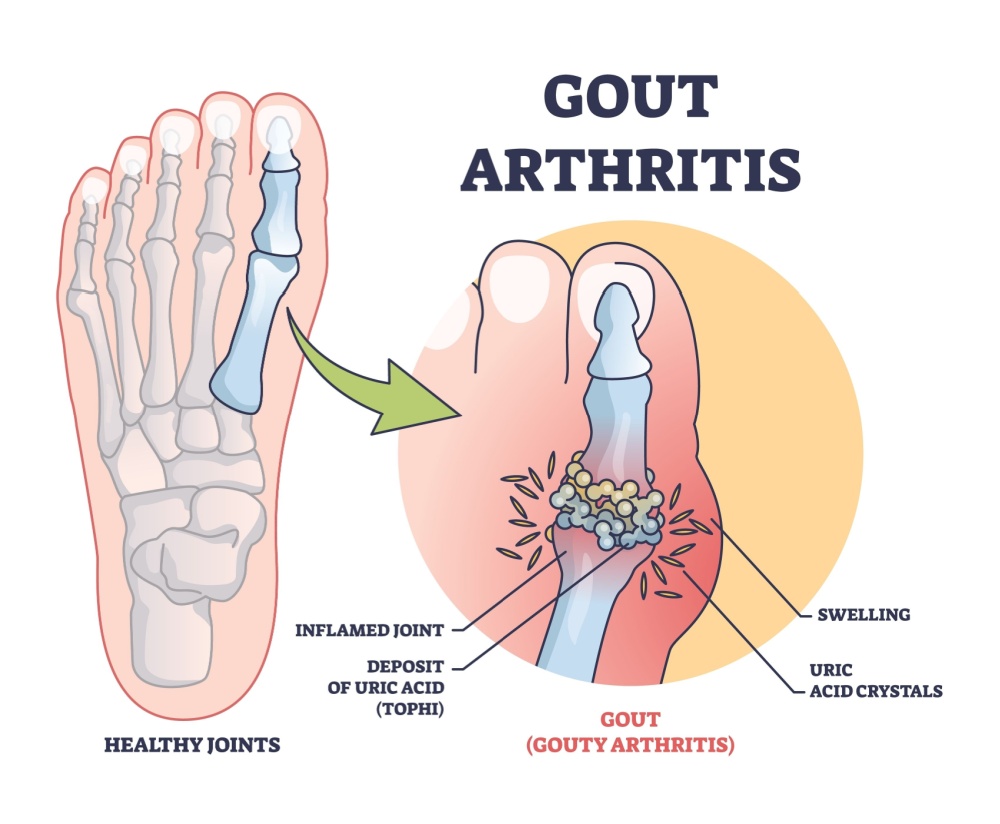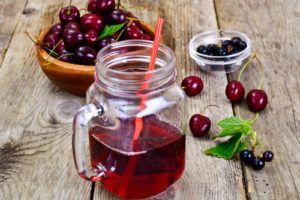What's On This Page?
ToggleFrom print to pixels, I’m here to help answer your health questions wherever you’re reading! This gout question from a reader in New York makes its way from my newspaper column to your screen, proving no topic is too small for our digital community.
Suzy, I suffer from gout and would like more information about this condition. What foods should I avoid, and what foods can help me? ~ L.B. New York
Even though the pain may be in your big toe, it can spread. Studies have found that the condition can spread, and ultimately affect the hand and wrist joints.
People with gout often wake up with an extremely painful, swollen joint, usually the big toe, but it could be any joint. You might have a fever, too. It occurs most often in men, and the condition can spread to other joints as the amounts of uric acid increase in the body.
Gout is associated with kidney stones, too, so getting to a physician is important. Now, if you wake up in the wee hours with pain, doctors usually recommend ibuprofen or naproxen to get you through the night because aspirin only makes it worse.
As far as foods go, meats, especially organs (liver, kidney, brains) raise uric acid levels, increasing your risk for gouty attacks and kidney stones. You should also eliminate sugar and caffeine and go easy or avoid anchovies, shellfish, mackerel, mushrooms, and yeast (baker’s and brewer’s). See my image below to know what to eat, and what not to!

Progression
This condition progresses through several stages and some people don’t even know they have it. This is my understanding of the progression of gout. The time you see a doctor is during the “acute” phase.
-
- Asymptomatic hyperuricemia: High uric acid levels without symptoms.
- Acute gouty arthritis: Sudden onset of intense pain and swelling in the joints.
- Intercritical period: Symptom-free intervals between acute painful attacks.
- Chronic tophaceous gout: The advanced stage with persistent symptoms and joint damage.
Medication and Supplement Offenders
At some point, you should look in your medicine cabinet. Some drugs and supplements increase your risk for symptoms of gout. For example, insulin, levodopa (for Parkinson’s), aspirin, niacin (found in supplements and in the drug Advicor), excessive Vitamin A, cyclosporine (calms the immune system), and diuretics (water pills used for high blood pressure) can all contribute to episodes. Drinking alcohol apparently matters too, since your first attack may occur after excessive intake.
The Prescription Gold Standard
Stress, overeating, and bumping your toe have also been reported as factors in gout attacks.
- Anti-inflammatory drugs: Such as non-steroidal anti-inflammatory drugs (NSAIDs) and colchicine.
- Uric acid-lowering drugs: Medications like allopurinol can help reduce uric acid production, and probenecid improves its excretion.
Sometimes ibuprofen, naproxen and other NSAIDs are used along with colchicine or allopurinol.

The Power of Cherries
Cherries, particularly tart ones, are not just delicious; they’re also powerful allies in the fight against gout. Consuming tart cherry extract or cherry juice can significantly reduce uric acid levels and inflammation. Studies have shown that cherries help block the enzymes that cause tissue inflammation, similar to how certain anti-inflammatory drugs work.
This makes cherries or cherry juice a natural and effective option for reducing gout flare-ups and pain. Whether you choose to consume the fruit directly, as juice, or as an extract, incorporating cherries into your diet could be a sweet way to manage your symptoms. You can read more about cherries and gout on the Arthritis Foundation WEBSITE.
Folk Remedies, Supplements and Foods
Quercetin and bromelain (from pineapple extract) are two natural and powerful anti-inflammatories which can reduce gouty attacks. Another simple supplement is a plant-based antioxidant, sold by your local health food store. What you eat really does matter. Another dietary consideration is to make your body more alkaline, and less acidic by eating more alkaline foods. Raw vegetables are a quick way to make your body more alkaline – lots of people juice them. People who go vegetarian make their bodies more alkaline naturally, so this is worth a try. There is some research to show that going alkaline can reduce arthritic pain.
Juice drinks are a tastier way to get the same type of antioxidants, which are very helpful at reducing inflammation and painful attacks.
Obviously, if you have gout, life may not feel like a bowl of cherries but eating them can help tremendously!! According to a popular folk remedy, you should eat a large cupful of cherries every day, fresh or frozen.

Foods to Avoid
Gout is triggered by high levels of uric acid in the body, which can form painful crystals in your joints. Certain foods can exacerbate these levels:
- High-purine foods: Avoid meats such as liver, kidney, and brains as these can increase uric acid levels.
- Seafood: Shellfish, anchovies, and mackerel are also high in purines.
- Sugars: Minimize intake of sugary foods and beverages, especially those containing high-fructose corn syrup.
- Alcohol: Beer and spirits can increase uric acid levels and reduce the body’s ability to remove it.
- Processed foods: These can contain additives and higher levels of sugars and unhealthy fats.
Foods to Include
Incorporating certain foods into your diet can help lower uric acid levels and reduce inflammation:
- Cherries: Consuming cherries and cherry extract can reduce uric acid levels and inflammation. A daily intake of a large cupful of cherries, fresh or frozen, has been recommended.
- Vegetables: Most vegetables are low in purines, particularly green leafy vegetables, which can help make your body more alkaline.
- Low-fat dairy products: Studies suggest that dairy products can lower the risk.
- Whole grains: Replace refined carbohydrates with whole grains to help maintain healthy uric acid levels.
- Water: Staying well-hydrated helps flush uric acid from your body.
In addition to diet, consider incorporating regular exercise and proper hydration into your routine. Exercise helps reduce uric acid levels and maintain a healthy weight, which is crucial for managing gout. Staying hydrated helps flush out excess uric acid, preventing painful crystals from forming. You may be interested in this article because it mentions allopurinol: 20 Supplements And Medicine That You Should Take With Food.

Technological Advancements in Managing Gout
Explore how modern technology can aid in managing gout. Mobile health apps can track food intake, medication schedules, and symptom patterns, providing a comprehensive tool to manage gout effectively. You’d have to look at the app store to see what’s current here. I’d make a suggestion, but apps come and go! You may be interested in my other article about apps and medical devices, Revolutionizing Health: 15 Life-Changing Wearables, Implantable And Stick-On Devices.
Summary
Dealing with gout involves more than just medication—it’s about lifestyle changes and dietary choices. Today, more than ever, understanding the relationship between what we consume and how our bodies react is essential in managing the conditions. Whether through traditional remedies or new dietary approaches, the journey to relief is both personal and possible.

Suzy Cohen, has been a licensed pharmacist for over 30 years and believes the best approach to chronic illness is a combination of natural medicine and conventional. She founded her own dietary supplement company specializing in custom-formulas, some of which have patents. With a special focus on functional medicine, thyroid health and drug nutrient depletion, Suzy is the author of several related books including Thyroid Healthy, Drug Muggers, Diabetes Without Drugs, and a nationally syndicated column.


